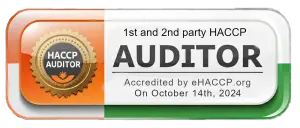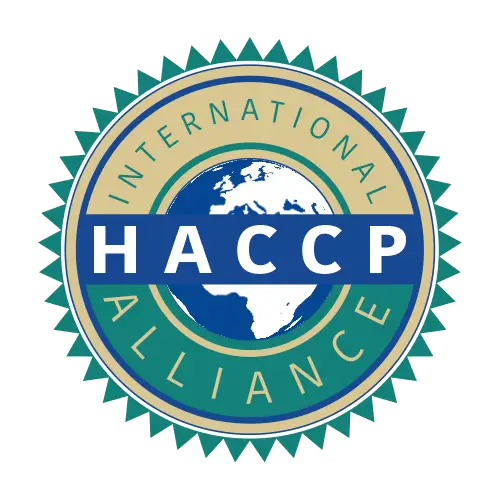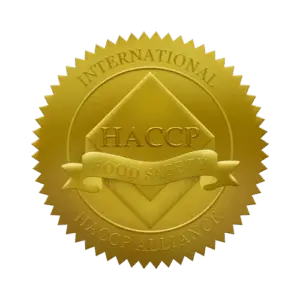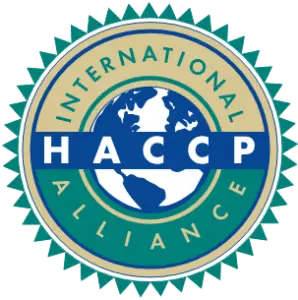Bundle: Certified HACCP & Food Safety Auditor & Certified HACCP Principles and GMPs for Food Processors and Manufacturers Course
- Duration: 15 hours
- Cost: $799



Take the prerequisite HACCP course (18 hours) and then take the Certified HACCP and Food Safety Auditor course (15 hours). Identify noncompliance issues and pass 3rd party audits. Auditor training and certification for HACCP and food safety management systems. SQF, BRC, Primus, HARPC, FSSC 22000 (Food Safety System Certification 22000).

Prerequisites
- Students are required to have a valid HACCP certification prior to enrollment.
- Students are expected to have prior knowledge and or working experience in Food Industry or related industries
Examinable
- Each of the 12 modules has a pool of questions related to the subject matter taught
- The module questions are optional, and the results do not count toward the final grade
- There is a final exam consisting of 24 questions pulled randomly from the modules
- Each exam is unique
Features
- Live support
- Bookmarking
- Mobile / Responsive
- SCORM compliant
- 1-year access
- Over 200 templates and other documentation
- A hard copy certification attesting your completion of 15 hours of HACCP Auditor training
- A hard copy certificate attesting to you completion of 18 hours of HACCP training
Subjects for HACCP Auditor Course
- What is a HACCP/Food Safety System Audit? – History, relevance, definitions.
- The Fundamentals of a HACCP Audit – Reviewing, evaluating, and testing.
- Introduction to ISO 19011:2018 – Guidelines for auditing management systems
- Introduction to internal auditor Codex HACCP, CAC/RCP 1-1969, rev 4-2003
- Managing an Audit Program – Develop a comprehensive audit schedule.
- Aspects of the Auditor – Integrity, Independence, Objectivity, etc.
- The Seven Steps of a HACCP Audit – Announcement, planning, opening meeting, review & testing, closing meeting, reporting, and follow-up.
- Initiating the Audit – Developing an audit strategy to realize the objectives.
- Undertaking the Document Review – Records of the planning and performance of the work, the procedures performed, evidence obtained, and conclusions reached by the auditor.
- Preparing for the Audit Review – Understanding the purpose and scope of the audit.
- Conducting Audit Activities – Assigning, conducting opening meetings, communicating, etc.
- Preparing the Audit Report – The introductory paragraph describes the scope and objectives of the audit, summarizes the findings, and provides the auditor’s opinion.
- Completing the Audit – Objective evidence to support the overall findings of the audit.
- Conducting Follow-Ups – Verify that the recommendations have been implemented effectively.
Subjects for Certified HACCP Course
- What is HACCP? – History, relevance, definitions. Food Safety Modernization Act requirements for and impacts on producers and processors
- Understand the Extent of Foodborne Illnesses – Requirements for and impacts on producers and processors
- Hazards Covered Under HACCP – Food and waterborne hazards
- Illnesses from Contaminated Water and Food – The associated illnesses of these hazards
- Conditions for Pathogen Growth and Survival – Examining FAT TOM and associated CCPs
- Documents and Procedures Required Prior to HACCP Plan Implementation – Prerequisites like GMPs, SOPs, SSOPs required to support the HACCP plan
- HACCP Prerequisites, Good Manufacturing Practices (GMP’s) Processors, Logistics, Packaging, RTE facilities – Specific SOPs, SSOPs, GMPs, and GAPs
- Developing Your HACCP Plan – The team, the product, and the process
- Applying the Seven Principles of HACCP – Hazard Analysis, Critical Control Points, Critical Limits, Monitoring,
- Corrective Actions, Verification, Record Keeping, Training, and Audits
Accredited by the International HACCP Alliance
Learning Outcomes Certified HACCP
- Understand the purpose and function of a HACCP system
- Recognize regulatory requirements for HACCP under the new Food Safety Modernization Act
- Identify conditions that promote waterborne and foodborne pathogen growth, recognize the steps needed to prevent pathogens, and learn corrective actions to control and reduce them
- Learn how to meet government, industry, and auditor requirements for the development, implementation, and maintenance of a working HACCP plan
- Learn USDA’s HACCP training requirements under 21 CFR Parts 416 and 417
- Learn how to implement Good Manufacturing Practices to support the plan
- Learn how to develop a strong HACCP team
- Understand why record keeping and training are crucial to HACCP success
Learning Outcomes HACCP Auditor
- Conduct thorough reviews of food safety systems and processes.
- Carry out both process and procedural or clause assessments.
- Act as an efficient auditor.
- Select an audit team and assess their effectiveness.
- Prepare thoroughly for the audit.
- Carry out the assigned process audits efficiently.
- Assess the findings along with assessing compliance, non-compliance, and areas for improvement effectively.
- Lead opening and closing meetings and document the audit results and non-compliance issues.
- Efficiently track the results of the audits.
- Examine HACCP and other food safety plans and systems to determine where and why noncompliance issues occur.
